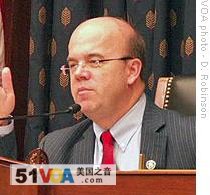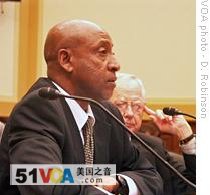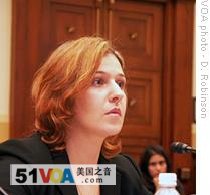Capitol Hill
22 April 2009
The situation in Sri Lanka, where government forces are fighting to eliminate the last stronghold of Tamil separatist rebels, was the subject of a U.S. congressional hearing Tuesday.
Discussion of the military conflict and what the United Nations and human rights groups call a dire humanitarian situation came during a hearing of the Tom Lantos Human Rights Commission, formerly known as the Congressional Human Rights Caucus.
Sri Lankan government troops are pressing an offensive against the separatist Liberation Tigers of Tamil Eelam in their last stronghold, the northern area of Vanni. Thousands of civilians have fled to government-controlled areas.
The Tamil Tiger rebels have fought for 25 years to establish an independent homeland for Sri Lanka's Tamil minority in the northern part of predominantly Sinhalese Sri Lanka. More than 70,000 people have died in the civil war.
 |
| Representative Jim McGovern, 21 Apr 2009 |
"The particular case we are exploring this afternoon, Sri Lanka, is a situation where both the government forces and the Tamil Tigers have abdicated their responsibility to protect from mass atrocities civilian non-combatant who are caught in the cross-fire of war," said Jim McGovern. "It has therefore fallen to the international community, and especially humanitarian organizations like UNHCR and the ICRC, along with a handful of NGO's, to try to assure their safety."
The International Committee of the Red Cross has warned of a catastrophic situation in which hundreds of civilians have been killed or wounded. The Sri Lankan government and Tamil separatists have issued varying casualty figures.
 |
| Amin Awad, UNHCR Representative to Sri Lanka, 21 Apr 2009 |
"The 100,000 who just left the no-fire zone are being processed by the [Sri Lankan] army in the district of Kilinochchi and the district of Mullaitivu," said Amin Awad. "This will become an extra burden on the already-meager resources and the limited space the government of Sri Lanka provided to receive the IDP's."
Awad puts the number of civilians remaining in the Tamil zone at 50,000 to 60,000, which he calls a conservative estimate. He says more than 9,000 people, many with serious injuries, have been evacuated since February.
The United Nations and Human rights groups have urged the Sri Lankan government and Tamil separatists to exercise restraint, with Awad urging additional humanitarian pauses. However, both came under sharp criticism in Tuesday's hearing.
Anna Neistat of Human Rights Watch says both warring parties have committed serious violations of international humanitarian law.
Tamil separatists, she says, continue to prevent civilians from fleeing to government-controlled areas and use them as human shields, while numerous casualties can be attributed to government artillery attacks.
 |
| Anna Neistat - Human Rights Watch, 21 Apr 2009 |
"The way that people are being treated now leaves little doubt that the welfare, quote unquote, of the inhabitants is the last thing on the government's agenda, and that leaves very little hope that people will be indeed resettled as well as that their other rights will be respected," said Anna Neistat.
The comment was also a response to a Sri Lankan Embassy statement, issued through a Washington public relations firm Patton Boggs, sharply criticizing Human Rights Watch and other non-government groups.
Despite what it called unfounded fears expressed by Human Rights Watch and other organizations, the statement said the government has an excellent track record of restoring war-torn areas and returning displaced persons to their homes as soon as practicable.
It said the United Nations and International Committee of the Red Cross have full access to 16 IDP camps, which the government says meet international standards and provide adequate shelter, food, medicine and services.
Miriam Young, Director of the U.S. Non-Government Organization Forum on Sri Lanka, says the most critical need is an immediate cessation of hostilities to allow the U.N., Red Cross, and other humanitarian agencies to provide food and medicine to those in need.
She urges the Obama administration to use its influence to press both warring parties to stop the fighting.
"This is an opportunity for the Obama administration to reassert our country's moral leadership on behalf of desperately vulnerable people," said Miriam Young. "Not to do so would mean the loss of tens of thousands more needless deaths [lives]."
The United States considers the Tamil Tigers a terrorist organization. The State Department on Tuesday appealed to both sides in the conflict to spare civilians, and urged the Sri Lankan government to permit international monitoring and access to sites where internally-displaced persons are being processed.